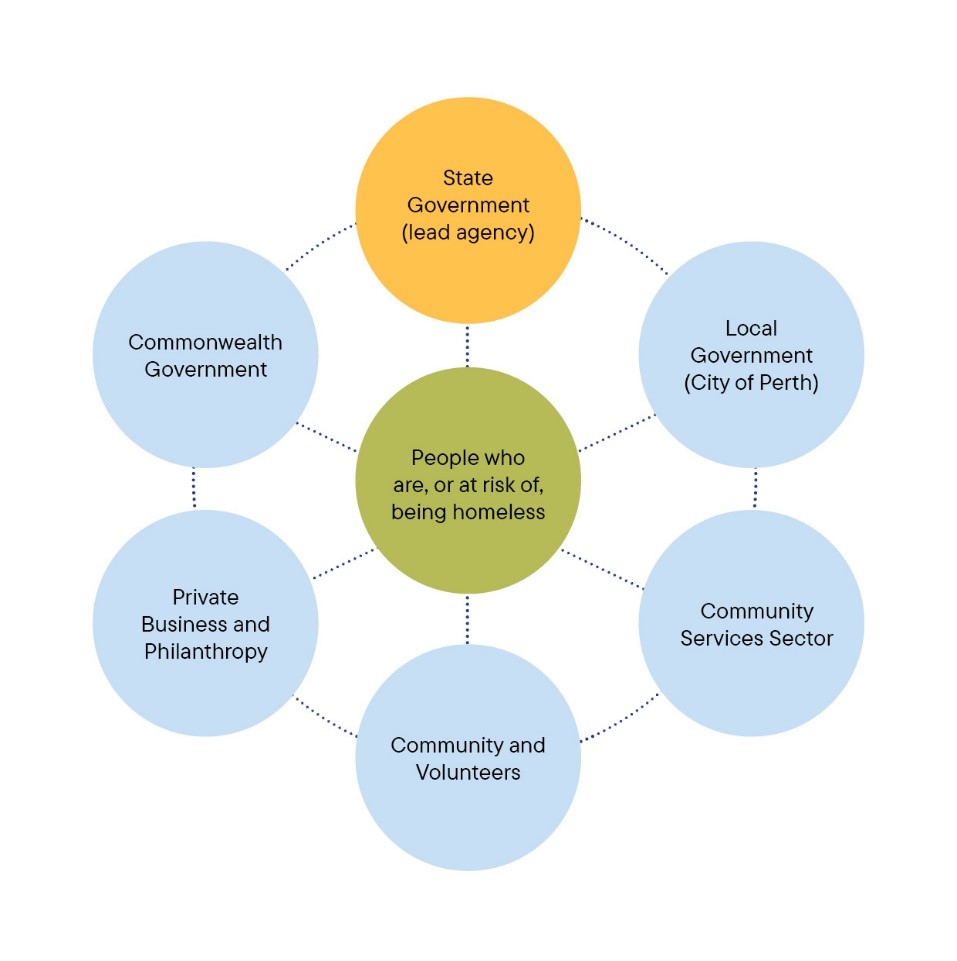
Homelessness
In WA, the lead agency for addressing homelessness and coordinating stakeholder actions is the State Government’s Department of Communities.
The diagram ‘The various roles in reducing homelessness’, as adapted from the Department’s All Paths Lead to a Home: Western Australia’s 10 Year Strategy on Homelessness (2020-2030) illustrates the different stakeholders and the roles they play.
"By defining and understanding our respective roles, we can achieve greater clarity about how we will work together to reach our vision and where we can affect the greatest positive change"
The City of Perth’s Homelessness Action Plan 2022-2024, endorsed by Council on 26 July 2022, can be found here.
Moore Street services
Our Moore Street facility works with close to 20 service providers offering meals, items such as clothes and sleeping bags, and access to a mobile laundry and shower. A street doctor and allied health services, alongside referrals to other services are also available onsite. Over 2023 – 2024, the site provided over 15,000 meals to people experiencing homelessness – you can view the roster of services available below.
-
The various roles in reducing homelessness

State Government
- Department for Communities (DoC) is the lead agency for homelessness in WA (particularly DoC’s sub-departments: the Office of Homelessness and the Housing Authority)
- Other state departments that intersect with homelessness, such as the Departments of: Justice, Education and Health (physical and mental health services) and WA Police
Local Government (City of Perth)
- Make information on local services and supports available and accessible
- Ensure front-line staff are informed and supported to interact with people experiencing homelessness and, where appropriate, refer them to local services
Community Services Sector
- Service design, delivery of homelessness services and advocacy
Community and volunteers
- Developing and delivering specialist homelessness services
- Working with government to better design and deliver services in partnership
Private business and philanthropy
- Increasing the overall resources available
- Creating opportunities for innovation
Commonwealth Government
- Responsible for: welfare and income support systems, immigration, housing market and tax system incentives/disincentives
- Contributes funds to the homelessness sector through the National Housing and Homelessness Agreement
People who are, or at risk of, being homeless
- As people with lived experience of the vulnerability of rough sleeping or homelessness, these individuals have a unique contribution to understanding service delivery (the benefits and the opportunities for improvement)
- Advocacy and peer support
-
Who to contact
It is important to inform the correct authority so the specific matter can be addressed.
If you or someone you know is experiencing homelessness, contact:- Crisis Care (Department of Communities): 9223 1111 or 1800 199 008
- Entrypoint: 1800 124 684
Engagement hubs for people experiencing homelessness:
- Ruah Engagement Hub: 13 78 24
247 James St Northbridge - Tranby Day Centre: 9220 1288
Unit 6/5 Aberdeen Street, East Perth
If you are a young person needing assistance:
- Passages Youth Engagement Hub: 9228 1478
- Youth Accomodation Support Service (Mission Australia): 9329 4480
- For LGBTIQ+ youth specific information, please contact PICYS 9388 2791 OR please see the brochure here
For more information of services available, please see the Homeless Services in the Inner City Directory.
If you need Social Support including food, non-urgent medical assistance, clothing/laundry, showering facilities, the Moore Street Accredited Site operates weekdays 5pm - 7pm. (please see the Moore Street Roster on the link in Related Documents)
Life threatening Emergency Assistance:- Ambulance, Police and Fire: 000
- Police Attendance (non-emergency): 131 444
All other inquiries or concerns relating to public spaces and thoroughfares including:
- Waste and Cleansing
- Welfare Concerns and Requests
can be directed to the City of Perth 9461 3333 or via info.city@cityofperth.wa.gov.au
Anti-social or public disturbances, Alcohol and Drugs and appearance of mental health concerns are to be reported to WA Police via 131 444 or 000 for emergencies.
If you are an individual wanting to volunteer your time or provide donations, please contact the peak bodies such as Volunteering WA, WACOSS, Shelter WA or a not-for-profit organisation.
If you are an organisation wanting to provide services in the city, please contact the Community Development Team via info.city@cityofperth.wa.gov.au -
References
1. Mago, V.K., Morden, H.K., Fritz, C., Wu, T., Namazi, S., Geranmayeh, P, Chattopadhyay, R., and Daddaghian, V., 2013. Analyzing the impact of social factors on homelessness: a Fuzzy Cognitive Map approach. BMC Med Inform Decision Making, 13(94). doi: 10.1186/1472-6947-13-94
2. Department for Communities (2020). All Paths Lead to a Home: Western Australia’s 10-Year Strategy on Homelessness 2020-2030
-
Safe Night Space (SNS) has closed
The SNS for women has closed, with the Centre reopening for community use as at 5 February 2024. All the details are available here.
Previous clients of the SNS service, please refer to ‘related documents’ for information on alternative services.
Forms
Related documents
- Moore Street - Accredited Homeless Services – Christmas Roster123.01 KB | PDF Document
- Moore Street Homeless Services Roster69.93 KB | PDF Document
- Homeless Services in the inner city2.02 MB | PDF Document
- Homeless Services in the Inner City Z-Card1.04 MB | PDF Document
- Homelessness Action Plan 2022 - 20249.17 MB | PDF Document
- LGBTIQ+ Youth Homelessness Info Brochure2.73 MB | PDF Document



